The Greens have called on the Albanese government to stare down the Trump administration’s threat of tariffs over tech taxes as the future of the news media bargaining code looks increasingly perilous.
On Friday night, US President Donald Trump signed an executive order titled “Defending American Companies and Innovators From Overseas Extortion and Unfair Fines and Penalties”.
The order threatens retaliatory tariffs against foreign governments accused of “increasingly exert[ing] extraterritorial authority over American companies, especially in the technology sector”.
Australia is the first explicitly named country in the order, albeit in the context of claiming that the US tech sector is bigger than the economy of a handful of nations including “Canada, or most members of the European Union”.
Australia has been at the forefront of global governments forcing tech companies to pay for journalism, with the introduction of the news media bargaining code in 2021 inspiring other governments to try to do the same.
Succeeding the 2021 news media bargaining code, the Albanese government announced the updated version of the policy in December but it has yet to pass Parliament.
Last week, the Nine papers reported that Australian trade officials said the government would not push on with its proposed news media bargaining incentive amid an already heated battle over whether Australia should face US tariffs.
Greens Senator and communications spokesperson Sarah Hanson-Young challenged the government to stand up to the “bully-boy” tactics of the Trump administration.
“Pandering to the tech bullies won’t serve Australia’s interests or ensure public interest journalism is protected. These big tech giants will never do the right thing by their users, journalists or the community unless they are forced to,” she said in a statement.
Beyond the news media bargaining code, Hanson-Young argued the US was also threatening other ways of regulating tech companies in Australia.
“Whether it’s paying for the journalism they use, or their dangerous algorithms that are used to generate massive profits from hate and abusive content and scams, these corporations must be held accountable,” she said.
“Donald Trump is not our president and his extreme tech oligarchy should not dictate Australian policies or regulation.”
The proposed incentive is designed to encourage companies running “digital platforms operating significant social media or search services” such as Meta, Google and TikTok to directly negotiate deals with Australian news media publishers or face a government levy that will fund journalism.
Early last year, Meta, which signed a number of deals with Australian news outlets in 2021, announced that it would not sign any further deals.
Since Trump’s initial tariff threat, Australian officials have trodden carefully with any policy plans that might upset the US president. Capital Brief reported last month that Assistant Treasurer Stephen Jones had reached out to both the Joe Biden administration and to Trump officials ahead of the announcement of the news bargaining incentive in December, underscoring the delicacy of the issue as Meta owner Mark Zuckerberg and X owner Elon Musk grow ever closer to Trump.
Monash University journalism Associate Professor Johan Lidberg said the news bargaining incentive, if implemented, would be a way for Australian news publishers to get certainty about ongoing funding for public interest journalism. He said that in his view, Australia’s reaction so far to Trump’s tariff threats risked coming off as “a bit cowardly”.
“[Pausing the news bargaining incentive] could be seen as Australia just bending over backwards to make sure that Trump and the US are pleased — the question I have is: where do you draw the line?”
But according to United States Studies Centre research director Jared Mondschein, Australia’s pause of its proposed tech levy makes strategic sense in light of Trump’s reelection.
“When Australia was doing these regulations on a lot of US tech firms, it was during the Biden administration, which was in many ways unique in that it did not mind more regulation of the big tech firms,” he told Crikey. “I think the environment in the US has changed, and I think Australia should consider whether it should move unilaterally or try to work with like-minded allies and partners towards a more sustainable solution for regulation.
“[Trump’s reelection] has definitely made regulating tech companies more complicated — that doesn’t mean you can’t do it, but it requires more nimble negotiations than under the Biden administration. I think unilaterally enacting regulations without consulting other like-minded allies and partners, including the US, will be more difficult and less sustainable.”
Disclosure: Private Media, which owns Crikey, signed deals with Meta and Google under threat of the news media bargaining code.
Have something to say about this article? Write to us at letters@crikey.com.au. Please include your full name to be considered for publication in Crikey’s Your Say. We reserve the right to edit for length and clarity.


